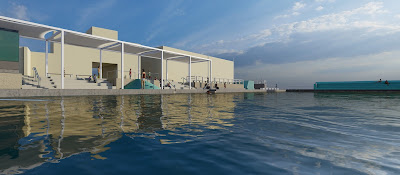BY KAYNE STEPHENS
Hunter Water is aiming to reduce costs for its customers as well as its impact on the environment through a $15 million upgrade of the utility's energy systems.
The NSW Government programme will contribute to Hunter Water's plans to become "carbon neutral" by 2030.
The corporation cites electricity costs as one of its major expenses, accounting for about 10 per cent of annual costs.
An array of solar panels have been constructed and are now ready for installation at the Branxton Wastewater Treatment Works. The corporations's Managing Director, Darren Cleary, says the plans are "a win for both our customers and the environment".
"The solar array at Branxton is the first project in a $15 million programme of works over the next four years with the aim of reducing our carbon footprint and reducing our electricity costs.
"We hope the project will deliver a reduction in our carbon emissions by 7,200 tonnes per year. That's the equivalent of taking 1,500 cars a year off the road as well as delivering savings for our electricity bill of over one million dollars each year," Mr Cleary said.
"So, a great outcome for both our customers and the environment."
The project was announced by NSW Water Minister, Melinda Pavey, who says a range of other sites are being shortlisted for solar upgrades.
“This investment is all about innovation and supporting jobs in the Hunter while also reducing Hunter Water’s electricity bill,” Mrs Pavey said.
“The 100 kilowatt system at Branxton Wastewater Treatment Works is the first in Hunter Water’s push for many solar projects, with savings generated helping to maintain affordable bills,” she said.
Sites at Morpeth, Kurri Kurri, and Raymond Terrace are among 20 which are part of the initial rollout.
It's expected the 252-panel installation at Branxton will contribute to an eventual $1.5 million electricity saving each year.
Hunter Water says its also considering other ways of reducing its environmental impacts while being mindful of household water bills.
"We'll continue to look at the technology as it evolves, as well as emerging technologies such as battery storage technology and floating solar," Mr Cleary said.
"We'll be pursuing these opportunities wherever they're viable."
The water utility says the project will deliver a 7.37% reduction in its electricity usage.
"Looking at our energy costs is really a great sustainability outcome. It has the benefits of both reducing costs - which is great for our customers - as well as reducing our environmental impact by reducing our carbon emissions," Mr Cleary said.
Mr Cleary says the solar upgrades are just one aspect of a range of new technologies being used in the Hunter region's water system.
"We've just commissioned a smart control system for our water network that looks at optimising our pumping regime to to minimise electricity use and energy costs. So it's a major focus of our organisation and that's because it has the dual benefits of reducing our resource consumption by reducing our carbon emissions and how much electricity we consume as well as reducing costs," he said.
Hunter Water says more information of its sustainability initiatives can be found at www.hunterwater.com.au/our-water/sustainability
 |
| The $15 million solar project is hoped to reduce carbon emissions as well as provide savings for customers. Image: Hunter Water |












